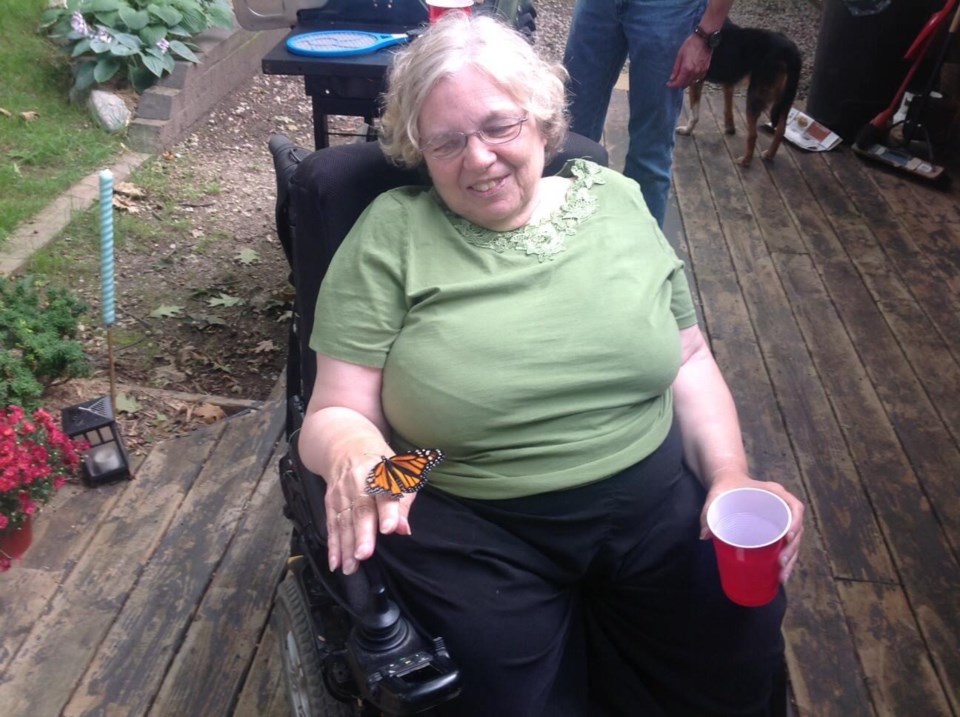Kathryn Bloomfield has spent years working to make life better for those living with a disability in South Georgian Bay.
For this week’s edition of People of Collingwood we spoke with Bloomfield, 68, vice-chair of Collingwood’s Accessibility Advisory Committee.
Q: For how long have you lived in the Collingwood area?
A: I’ve lived here in Collingwood for three years.
Q: Where did you grow up?
A: I grew up out in Honeywood, Ont.
I went away to university. I went to the University of Waterloo and I took mathematics and business administration. I worked in Kitchener for a few years at the Waterloo County Board of Education.
When I came back, married, my husband and I bought a farm.
It wasn’t my idea to come back; it was my husband’s. I used to say I came back kicking and screaming. (laughs)
I’m so glad we did.
Q: You were one of the founders of Breaking Down Barriers. When did Breaking Down Barriers start, and what led you to want to start such a program?
A: In 1982 I had done a school awareness program, and worked with the March of Dimes.
When that ended, I thought there was a lack of services in the Collingwood area for people with disabilities. I was unemployed, and I was approached by Marg Scheben-Edey, who was with the employment development council for the federal government.
They wanted to put some money into a disability project.
With my friends at the March of Dimes in Barrie, we came up with a three-prong project to study accessibility in the area and put together a book for people on the subject, and to start a group to continue work and continue raising awareness when the project was done.
We did that for a year and people started dropping in to our office in Collingwood to talk about issues they had.
When the project was done, people said, “You guys can’t close.”
Marg found us a way to get more funding for a second year, and that was how Breaking Down Barriers started.
From 1985 to 2000, I was the executive director. I filled in here and there for a few years, and eventually I decided to retire.
Q: What is the nature of your own disability?
A: I have spina bifida. It’s a hole in your spine. It’s something you’re born with and can be different levels depending on where it attacks your spine. Mine is just above the waist level, so I have full use of my arms.
Q: This week is National AccessAbility Awareness Week. Is there anything you wish people understood more about accessibility, or are there any misconceptions about accessibility you’d like to talk about?
A: As a person who uses a power chair, it is so frustrating sometimes when you can’t go and do the things that everybody else can do and takes for granted.
It has got better. When I go to stores, sometimes I have to sit outside and they bring things to me because there are steps.
People take steps for granted. They don’t even notice them, but they’re a great, big barrier.
There’s some attitudinal things that go with it sometimes.
It sounds silly, but it frustrates me when people say things like, “It’s nice that you can get out today.”
I’m out every day. I don’t only go out when there’s sunshine. Maybe that’s my problem, not theirs. I don’t know. (laughs)
Q: You serve as vice-chair on Collingwood’s Accessibility Advisory Committee, but what are some of your other hobbies?
A: I spend a lot of time on the computer. I watch a lot of television.
I’m also on the South Georgian Bay Client Family Advisory Committee. I think that’s what it’s called.
I enjoy that because it’s dealing with the background of our health system and how we can make it better for everybody.
My husband was a paraplegic from a car accident and he had additional disabilities. I was his caregiver for a lot of years.
I feel like I can see things from different sides, and I feel you can’t really understand some things until you experience them.
Q: Is there anything else you’d like people in Collingwood to know about you?
A: I’ve been treated so well in general by people in this area.
I worked in Orangeville before I came here and everything I wanted to talk about was so difficult there.
When I came to Collingwood, it was like people opened their arms to my ideas.
I just have such a thankful heart for all the people I’ve worked with and who have helped to move this whole accessibility thing forward.
Rick Hansen is my role model. He wheeled across the world. When he came on the scene and started doing things, it was like, all of a sudden, people with disabilities were people. People wanted to be around him. He was down to earth.
I used to always say that before Rick Hansen, people were afraid of people with disabilities. Afterwards, they were OK with touching us. It sounds silly, but it’s how I feel.
It’s stuck with me and keeps me persevering.
For our feature People of Collingwood, we’ll be speaking with interesting people who are either from or are contributing to the Collingwood community in some way, letting them tell their own stories in their own words. This feature will run on CollingwoodToday every weekend. If you’d like to nominate or suggest someone to be featured in People of Collingwood, email [email protected].



